英语培训资料
- 格式:ppt
- 大小:1.17 MB
- 文档页数:3
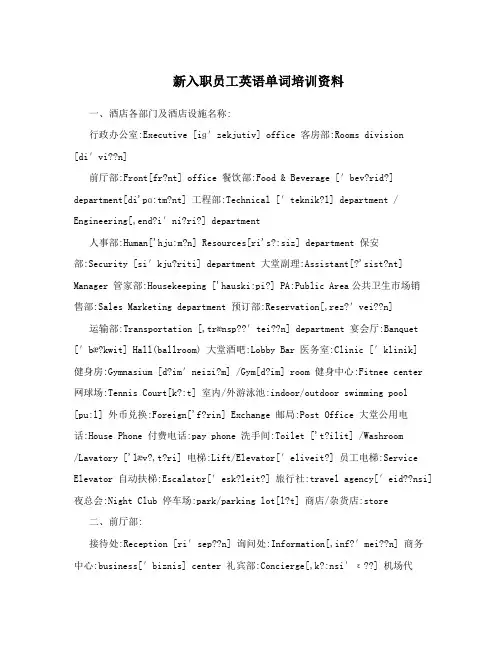
新入职员工英语单词培训资料一、酒店各部门及酒店设施名称:行政办公室:Executive [iɡ′zekjutiv] office 客房部:Rooms division [di′vi??n]前厅部:Front[fr?nt] office 餐饮部:Food & Beverage [′bev?rid?] department[di'pɑ:tm?nt] 工程部:Technical [′teknik?l] department / Engineering[‚end?i′ni?ri?] department人事部:Human['hju:m?n] Resources[ri's?:siz] department 保安部:Security [si′kju?riti] department 大堂副理:Assistant[?'sist?nt] Manager 管家部:Housekeeping ['hauski:pi?] PA:Public Area公共卫生市场销售部:Sales Marketing department 预订部:Reservation[‚rez?′vei??n] 运输部:Transportation [‚trænsp??′tei??n] department 宴会厅:Banquet [′bæ?kwit] Hall(ballroom) 大堂酒吧:Lobby Bar 医务室:Clinic [′klinik]健身房:Gymnasium [d?im′neizi?m] /Gym[d?im] room 健身中心:Fitnee center 网球场:Tennis Court[k?:t] 室内/外游泳池:indoor/outdoor swimming pool [pu:l] 外币兑换:Foreign['f?rin] Exchange 邮局:Post Office 大堂公用电话:House Phone 付费电话:pay phone 洗手间:Toilet ['t?ilit] /Washroom/Lavatory ['læv?‚t?ri] 电梯:Lift/Elevator[′eliveit?] 员工电梯:Service Elevator 自动扶梯:Escalator[′esk?leit?] 旅行社:travel agency[′eid??nsi] 夜总会:Night Club 停车场:park/parking lot[l?t] 商店/杂货店:store二、前厅部:接待处:Reception [ri′sep??n] 询问处:Information[‚inf?′mei??n] 商务中心:business[′biznis] center 礼宾部:Concierge[‚k?:nsi′ε??] 机场代表:Airport Representative[‚repri′zent?tiv] 皇冠楼层:Clubfloor/Executive[iɡ′zekjutiv] Floor 总机:Operator[′?p?reit?]/Switchboard[′swit?‚b?:d] 酒店人员用房:house use 散客:walk in 净房价:net rate 没有通知取消而又未到的预订:no show 坏房:out of order 吉(空)房:vacant[′veik?nt] 有人住的房间:occupied[′?kjupaid] 客满:full house 入住登记:check in 退房:check out 提升:upgrade [′?pɡreid] 半日用房:day use留言条:message [′mesid?] 共计:total 价钱:price[prais] 基本费:basic[′beisik] charge[t?ɑ:d?] 附加费:surcharge[s?:′t?ɑ:d?]/ additional charge 手续费:commission[k?′mi??n] charge 服务费:cover charge/ service charge 信用卡:credit[′kredit] card 值班经理:MOD(manager on duty) 残疾人用房:handicap[′hændikæp] room 转房:room change[t?eind?]三、礼宾部行李:luggage[′l?ɡid?] (英)/baggage[′bæɡid?] (美) 手提包:handbag[′hændbæɡ] 手提箱/衣箱:suitcase[′sju:tkeis] 旅行袋:travel[′trævl] bag 背包:kitbag[′kitbæɡ] 贵重物品:valuable[′vælju?bl] 易碎物品:breakable [′breik?b?l] 笔记本电脑:laptop ['læpt?p] 帆布:canvas ['kænv?s] 塑料:plastic ['plæstik,plɑ:stik] 银色:silver ['silv?] 粉红色:pink[pi?k] 深蓝色:navy['neivi]blue/dark [dɑ:k]blue 紫色:purple 灰色:grey[ɡrei]/gray 行李标签:label['leibl]/tab[tæb]/tag [tæɡ] 包裹:parcel['pɑ:sl] 告示牌:signboard['sainb?:d] 护照:passport['pɑ:sp?:t] 身份证:identity[ai'dentiti] card 小册子:brochure[br?u'?ju?] 观光(n./vi.):sightseeing['saitsi:i?]/sightsee ['saitsi:] 一天游:full dayexcursion 半天游:half day excursion [iks'k?:??n] 旅行社:travel agency 导游:guide [ɡaid] 领队:tour conductor [k?n'd?kt?] 车费:fare[fε?] 免费:free[fri:] 单程车费:one way fare 来回车接送:round[raund] trip [trip] transfer[træns'f?:] 轿车服务:limousine ['limu(:)zi:n] service ['航空公司:airline ε?lain] company/airways ['ε?weiz] 飞机班次:flight[flait] number 机场快线:airport express [iks'pres] 粗绳:rope [r?up] 登机牌:boarding['b?:di?] check/pass/card *号键:as terisk['æst?risk] (key) #号键:pound[paund] sign/pound key 电池:battery ['bæt?ri] 移动电话:mobile['m?ubail](phone) 充值卡:recharge [' ri:'t?ɑ:d?] card 行李车:trolley['tr?li]四、家具furniture['f?:nit??]:窗帘:curtain ['k?:t?n] 婴儿床:crib[krib] 加床:extra ['ekstr?] bed 茶几:teatable 衣柜:wardrobe['w?:dr?ub] 行李架:baggage stand/rack [ræk] 床头柜:night table/bedstand 椅子:chair 抽屉:drawer['dr?:?] 沙发:sofa['s?u f?] 长沙发/长靠椅:settee[se'ti:]五、电器:开关:switch[swit?] 台灯:desk lamp[læmp]/reading lamp 床头灯:bedlamp/bedlight/bedside lamp 落地灯:standard lamp/floor lamp 灯罩:lampshade['læmp?eid] 小酒吧:mini bar电热水壶:(electric[i'lektrik] )kettle['ketl] 空气调节装置:air conditioner[k?n'di??n?] 电冰箱:refrigerator[ri'frid??reit?]/fridge [frid?] 电视机:television['telivi??n]æpt?(r)] 熨斗:iron['ai?n] 熨板:ironing board 充电器:charger 多用途插座:adapter[?'d磅秤:scale[skeil] 传真机:fax[fæks] machine[m?'?i:n] 吹风筒:hairdryer [' drai?] 宽带:broad[br?:d] band[bænd] 宽带线:cable ['keibl] 无线的:wireless ['wai?lis] 遥控器:remote[ri'm?ut] control[k?n'trol] 打印机:Printer六、客房用品:衣架:hanger['hæ??] 烟灰缸:ashtray ['æ?trei] 冰桶:ice barrel['bær?l] 糖:sugar['?uɡ?] 即溶咖啡:instant['inst?nt] coffee 废纸篓:wastebasket['weist‚bɑ:skit] 圆珠笔:ball pen 文具夹:stationery['stei?(?)n?ri] holder ['h?uld?] 信封:envelope['envil?up] 回形针:clip[klip] 手电筒:flashlight['flæ?lait] 钉书机:staple['steipl] 雨伞:umbrella 衣柜:wardrobe['w?:dr?ub] 送餐餐牌:door knob[n?b] menu['menju:] 请勿打扰卡:do not disturb[dis't?:b] (DND Card) 拖鞋:slipper['slip?] 洗衣服务:laundry [' l?:ndri] service 洗衣单:laundry list[list] 洗衣袋:laundry bag 叫早服务:morning call(service)/wake up call 鞋刷:shoe brush [br??] 鞋油:shoe polish['p?li?]/shoeshine ['?u:?ain] 剪刀:scissors['siz?z]针线包:sewing ['s?ui?] kit [kit] 胶水:glue[ɡlu:] 玻璃胶纸:tape [teip] 开罐器:can opener ['?up?n?] 冰夹:ice tongs[t??z] 保险箱:safety [' seifti] box 开瓶塞钻子:corkscrew [' k?:kskru:] 牙签:toothpick ['tu:θpik] 垃圾箱(英/美):du stbin ['d?stbin]/ ashcan['æ? kæn] 城市地图:city map 服务指南:service guide 电视节目单:TV program['pr?uɡræm] guide[ɡaid] 总经理名片:GM's card 床垫:mattress['mætris] 地毯:carpet[' kɑ:pit] 全身镜:looking glass 床单:bedsheet [bed?i:t] 毯子:blanket ['blæ?kit] 枕头:pillow['pil?u] 枕头套:pillowca se[′pil?ukeis] 羽绒被:duvet [du:′vei] 鞋拔:shoehorn ['?u:h?:n]七、浴室用品:['bɑ:θru:m] 抽水马桶:lavatory 浴帽:shower['?au?] cap[kæp] 毛巾:towel['tau?l] 浴室:bathroom浴巾:bath towel 肥皂:soap[s?up] 洗发水:shampoo [?æm'pu:] 护发素:hair conditioner [k?n'di??n?] 沐浴露:foam [f?um] bath 浴盐:bath salts [s?:ltz] 润肤露:body lotion['l?u??n] 棉签:cotton['k?tn] bud[b?d] 浴袍:bathrobe['bɑ:θr?ub] 牙膏:toothpaste['tu:θpeist] 牙刷:toothbrush['tu:θbr??] 梳子:comb [k?um] /hair brush 剃刀:shaver['?eiv?] 须刨:razor ['reiz?] 纸巾:tissue ['tisju:] 厕纸:toilet paper 女宾清洁袋:lady's sanitary ['sænit?ri] bag 空气清新剂:airfreshener['fre??n?(r)] 花洒:rain[rein] shower八、餐饮:中国餐厅:chinese restaurant 海鲜餐厅:seafood restaurant 自助餐:buffet['b?fit] 早茶:tea breakfast 下午茶:high tea 点心:dimsum['dim's?m]/refreshment[ri'fre?m?nt] 面条:noodle['nu:dl] 稀饭/粥:conjee/congee['k?nd?i:] 粤菜:Cantonese[‚kænt?'ni:z] style[stail] 营业时间:business hours 欢乐时光:happy hour 茶壶:tea pot[p?t] 筷子:chopsticks['t??pstiks]汤匙:soup[su:p] spoon[spu:n] 餐叉:fork[f?:k] 水果盘:fruit[fru:t]plate[pleit]九、其它:老虎钳:plier['plai?] 螺丝刀:screwdriver[' skru:draiv?] 锤子:hammer['hæm?]计算机:calculator['kælkjuleit?] 翡翠:jade[d?eid] 翻版:counterfeit['kaunt?fit]/fake[feik] 皮革制品:leather ['leð?] 名牌:famous brand[brænd] 邮票:stamp[stæmp] 珍珠:pearl 水果:fruit 药房:drugstore 打火机:lighter['lait?] 火柴:match 扑克牌:squeezer/playing card 安全套:condom 卫生巾:sanitary towel 对讲机:walkie-talkie十、广州各主要酒店名字:白天鹅宾馆:White swan[sw?n] hotel 花园酒店:Garden hotel 中国大酒店:China hotel 东方宾馆:Dongfang hotel 亚洲国际大酒店:Asia['ei??] international hotel富力丽兹卡尔顿酒店:The Ritz[rits]-Carlton['k天誉威斯汀酒店:TheWestin GuangZhou ɑ:lt?n] GuangZhou 富力君悦酒店:Grand Hyatt GuangZhou 艾葳格兰花园酒店:Evergrande garden hotel 长隆酒店:ChimeLong[t?aim,l??] hotel 远洋宾馆:Ocean['?u??n] hotel 胜利宾馆:Victory['vikt?ri] hotel 广东迎宾馆:Guangdong guest house 华夏大酒店:Landmark ['lændmɑ:k] Canton['kæn't?n] hotel 广州大厦:Hotel Canton 景星酒店:Star hotel 中央酒店:Central[sen'trɑ:l] hotel 江湾大酒店:Riverside [' riv?said] hotel 爱群大酒店:Aiqun hotel 白云宾馆:BaiYun hotel 国泰宾馆:Cathay[kæ'θei]Pacific[p?'sifik] hotel 招商宾馆:China merchants['m?:t??ntz] hotel 外商活动中心:Foreign['f?rin] businessmen club 广州建国酒店:JIANGUO hotel 假日酒店:Holiday inn 广州国际金融大厦:Guangzhou internationalfinancial[fai'næn??l] building 华美达酒店:Ramada pearl[p?:l] 广州十甫假日酒店:Holiday inn SHIFU GuangZhou 丽柏广场:La[lɑ:] Perle [pЗ:l] 天河城:Tee mall 中信广场:CITIC Plaza 正佳广场:Grandview mall 陶陶居:TAOTAOJUrestaurant 莲香楼:LIANXIANGLOU 太平洋电脑城:Pacific PC center 凯悦酒家:The deluxe restaurant十一、房间类型补充:高级吸烟双床房(TTWS):superior [sju:'pi?ri?] twin smoking高级非吸烟双床房(TTWN):superior twin non smoking 高级吸烟大床房(KNGS):superior king smoking高级非吸烟大床房(KNGN):superior king non smoking 豪华吸烟双床房(TFTS):deluxe [di'l?ks, di'luks] twin smoking 豪华非吸烟双床房(TFTN):deluxe twin non smoking豪华吸烟大床房(KFTS): deluxe king smoking 豪华非吸烟大床房(KFTN): deluxe king non smoking 豪华吸烟大床套房(XFTS):deluxe suite king smoking 豪华非吸烟大床套房(XFTN):deluxe suite king non smoking 行政楼层吸烟大床房(KEXS):club floor king smoking 行政楼层非吸烟大床房(KEXN):club floor king non smoking 行政楼层吸烟双床房(TEXS):club floor twin smoking 行政楼层非吸烟双床房:(TEXN)club floor twin non smoking 行政楼层吸烟大床套房(XEXS):club floor suite king smoking 行政楼层非吸烟大床套房(XEXN):club floor suite king non smoking 行政楼层吸烟三房套房(XOTS):club floor three bays suite smoking (include one king bed room & one twin beds room) 行政楼层非吸烟三房套房(XOTN):club floor three bays suite non smoking (include one king bed room & one twin beds room)双床残疾人用房(TWCS):disable room twin smoking 总统套房(XSTS): presidential[‚prezi'den??l] suite (six bays)。
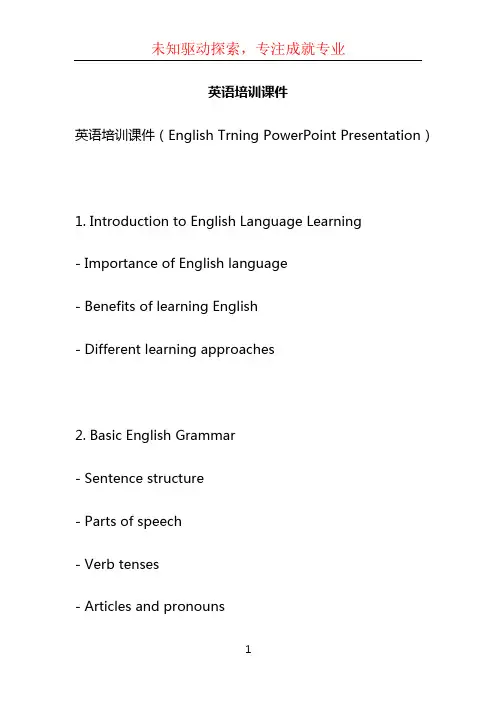
英语培训课件英语培训课件(English Trning PowerPoint Presentation)1. Introduction to English Language Learning- Importance of English language- Benefits of learning English- Different learning approaches2. Basic English Grammar- Sentence structure- Parts of speech- Verb tenses- Articles and pronouns3. Vocabulary Building- Word formation- Synonyms and antonyms- Idioms and expressions- Prefixes and suffixes4. Reading Comprehension- Strategies for improving reading skills - Understanding mn ideas and detls- Text analysis and interpretation5. Listening and Speaking Skills- Listening comprehension exercises- Speaking practice and role plays- Pronunciation and intonation6. Writing Skills- Essay writing techniques- Formal and informal writing styles- Grammar and sentence structure in writing7. Test Preparation- Tips for TOEFL/IELTS exams- Practice exercises and mock tests- Time management strategies8. Cultural Awareness- Understanding different English-speaking cultures- Cultural norms and etiquette- Cross-cultural communication skills9. Business English- Vocabulary and phrases for business communication- Writing professional emls and letters- Presentation skills for meetings and conferences10. Interactive Activities and Games- Group discussion and debates- Vocabulary games and quizzes- Role plays and skits以上是一个典型的英语培训课件的内容大纲,可以根据具体培训需求进行调整和修改。
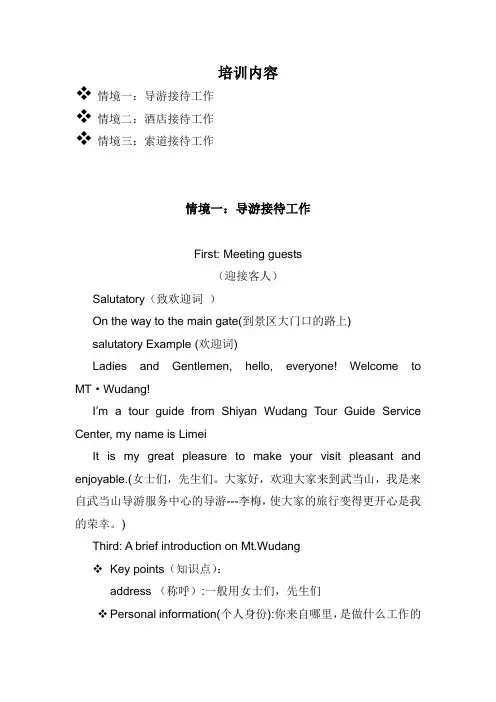
培训内容情境一:导游接待工作情境二:酒店接待工作情境三:索道接待工作情境一:导游接待工作First: Meeting guests(迎接客人)Salutatory(致欢迎词)On the way to the main gate(到景区大门口的路上)salutatory Example (欢迎词)Ladies and Gentlemen, hello, everyone! Welcome to MT·Wudang!I‟m a tour guide from Shiyan Wudang Tour Guide Service Center, my name is LimeiIt is my great pleasure to make your visit pleasant and enjoyable.(女士们,先生们。
大家好,欢迎大家来到武当山,我是来自武当山导游服务中心的导游---李梅,使大家的旅行变得更开心是我的荣幸。
)Third: A brief introduction on Mt.WudangKey points(知识点):address (称呼):一般用女士们,先生们Personal information(个人身份):你来自哪里,是做什么工作的Express thanks(表达感谢):感谢游客来武当山旅游。
Second: Waiting for bus(等候景区旅游巴士)ExampleFor environment protection of Mt·Wudang, every tourists need to take a Sightseeing bus, which discharged gas is more clear compare with a common bus. (为了保护武当山的环境,所有的游客来到这里都必须乘坐景区观光巴士。
相对于普通巴士来说,它排出的废气更干净。
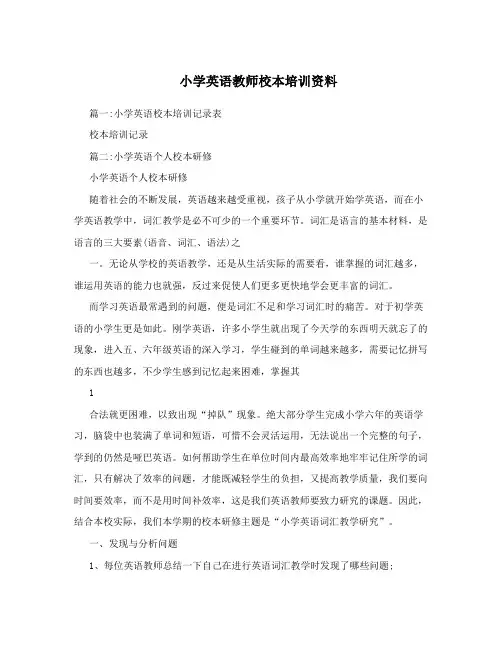
小学英语教师校本培训资料篇一:小学英语校本培训记录表校本培训记录篇二:小学英语个人校本研修小学英语个人校本研修随着社会的不断发展,英语越来越受重视,孩子从小学就开始学英语,而在小学英语教学中,词汇教学是必不可少的一个重要环节。
词汇是语言的基本材料,是语言的三大要素(语音、词汇、语法)之一。
无论从学校的英语教学,还是从生活实际的需要看,谁掌握的词汇越多,谁运用英语的能力也就强,反过来促使人们更多更快地学会更丰富的词汇。
而学习英语最常遇到的问题,便是词汇不足和学习词汇时的痛苦。
对于初学英语的小学生更是如此。
刚学英语,许多小学生就出现了今天学的东西明天就忘了的现象,进入五、六年级英语的深入学习,学生碰到的单词越来越多,需要记忆拼写的东西也越多,不少学生感到记忆起来困难,掌握其1合法就更困难,以致出现“掉队”现象。
绝大部分学生完成小学六年的英语学习,脑袋中也装满了单词和短语,可惜不会灵活运用,无法说出一个完整的句子,学到的仍然是哑巴英语。
如何帮助学生在单位时间内最高效率地牢牢记住所学的词汇,只有解决了效率的问题,才能既减轻学生的负担,又提高教学质量,我们要向时间要效率,而不是用时间补效率,这是我们英语教师要致力研究的课题。
因此,结合本校实际,我们本学期的校本研修主题是“小学英语词汇教学研究”。
一、发现与分析问题1、每位英语教师总结一下自己在进行英语词汇教学时发现了哪些问题;2、以年级备课组为单位,归纳分析本年级英语组在利用进行英语词汇教学时出现了哪些问题;3、以英语教研组为单位,汇总我们在小学英语词汇教学中产生的较为普遍的问题,加以分析。
二、研修原则(一)自主性原则:以学生为主体,让每个学生自主参与词汇的认知、感受过程,教师给予恰当的启发和指导。
(二)实践性原则:根据中段学生的认识规律和年龄特点,让他们在活动中多动手、多动脑思考,多动口表达,在实践的基础上理解,开发学生的学习潜能。
(三)趣味性原则:以激发学生的学习、钻研的兴趣为着2眼点,使学生喜欢词汇的积累学习,乐意参与,达到寓教于乐目的。
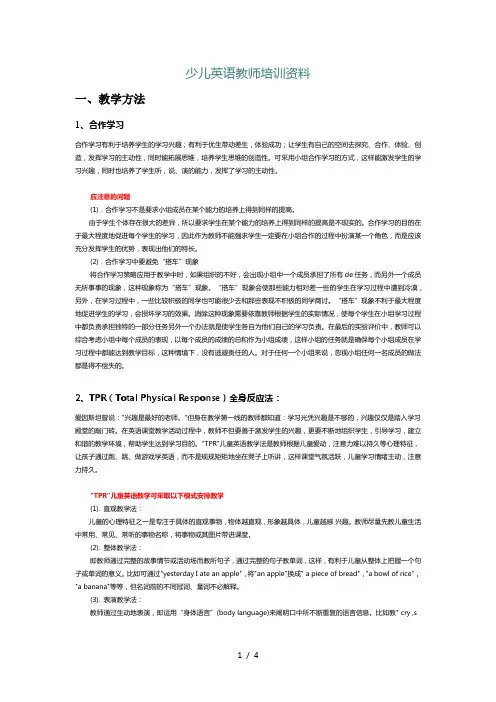
少儿英语教师培训资料一、教学方法1、合作学习合作学习有利于培养学生的学习兴趣;有利于优生带动差生,体验成功;让学生有自己的空间去探究、合作、体验、创造,发挥学习的主动性,同时能拓展思维,培养学生思维的创造性。
可采用小组合作学习的方式,这样能激发学生的学习兴趣,同时也培养了学生听,说、演的能力,发挥了学习的主动性。
应注意的问题(1).合作学习不是要求小组成员在某个能力的培养上得到同样的提高。
由于学生个体存在很大的差异,所以要求学生在某个能力的培养上得到同样的提高是不现实的。
合作学习的目的在于最大程度地促进每个学生的学习,因此作为教师不能强求学生一定要在小组合作的过程中扮演某一个角色,而是应该充分发挥学生的优势,表现出他们的特长。
(2).合作学习中要避免“搭车”现象将合作学习策略应用于教学中时,如果组织的不好,会出现小组中一个成员承担了所有de任务,而另外一个成员无所事事的现象,这种现象称为“搭车”现象。
“搭车”现象会使那些能力相对差一些的学生在学习过程中遭到冷漠,另外,在学习过程中,一些比较积极的同学也可能很少去和那些表现不积极的同学商讨。
“搭车”现象不利于最大程度地促进学生的学习,会损坏学习的效果。
消除这种现象需要依靠教师根据学生的实际情况,使每个学生在小组学习过程中都负责承担独特的一部分任务另外一个办法就是使学生各自为他们自己的学习负责。
在最后的实验评价中,教师可以综合考虑小组中每个成员的表现,以每个成员的成绩的总和作为小组成绩,这样小组的任务就是确保每个小组成员在学习过程中都能达到教学目标,这种情境下,没有逃避责任的人。
对于任何一个小组来说,忽视小组任何一名成员的做法都是得不偿失的。
2、TPR(Total Physical Response)全身反应法:爱因斯坦曾说:"兴趣是最好的老师。
"但身在教学第一线的教师都知道:学习光凭兴趣是不够的,兴趣仅仅是踏入学习殿堂的敲门砖。
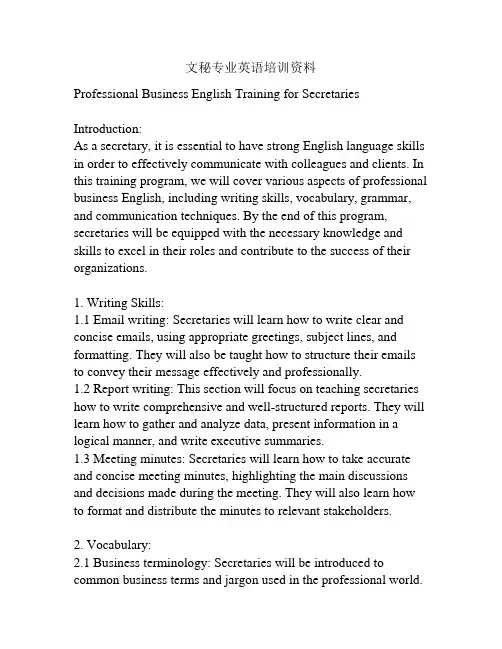
文秘专业英语培训资料Professional Business English Training for Secretaries Introduction:As a secretary, it is essential to have strong English language skills in order to effectively communicate with colleagues and clients. In this training program, we will cover various aspects of professional business English, including writing skills, vocabulary, grammar, and communication techniques. By the end of this program, secretaries will be equipped with the necessary knowledge and skills to excel in their roles and contribute to the success of their organizations.1. Writing Skills:1.1 Email writing: Secretaries will learn how to write clear and concise emails, using appropriate greetings, subject lines, and formatting. They will also be taught how to structure their emails to convey their message effectively and professionally.1.2 Report writing: This section will focus on teaching secretaries how to write comprehensive and well-structured reports. They will learn how to gather and analyze data, present information in a logical manner, and write executive summaries.1.3 Meeting minutes: Secretaries will learn how to take accurate and concise meeting minutes, highlighting the main discussions and decisions made during the meeting. They will also learn how to format and distribute the minutes to relevant stakeholders.2. Vocabulary:2.1 Business terminology: Secretaries will be introduced to common business terms and jargon used in the professional world.They will learn how to use these terms appropriately in their oral and written communication.2.2 Industry-specific vocabulary: Depending on the industry they work in, secretaries will learn industry-specific vocabulary relevant to their organization. This will enable them to better understand and communicate with colleagues and clients.3. Grammar:3.1 Review of grammar rules: Secretaries will review essential grammar rules, such as tenses, articles, and sentence structure. Emphasis will be placed on common mistakes and how to avoid them.3.2 Sentence construction: This section will focus on teaching secretaries how to construct clear and grammatically correct sentences. They will learn techniques to improve sentence flow and coherence.4. Communication Techniques:4.1 Active listening: Secretaries will learn how to actively listen to colleagues and clients, ensuring they fully understand their needs and requirements. They will also learn how to ask relevant questions to clarify any uncertainties.4.2 Telephone etiquette: This section will cover basic telephone etiquette, including proper greeting, tone of voice, and effective communication over the phone.4.3 Body language: Secretaries will learn how to understand and interpret body language, enabling them to better communicate and build rapport with colleagues and clients.Conclusion:By mastering the skills taught in this training program, secretaries will be able to communicate more effectively and professionally in both written and oral English situations. These skills will not only enhance their performance as secretaries but also contribute to the overall success of their organizations. It is recommended that secretaries regularly practice and reinforce these skills to ensure continuous improvement.5. Cultural Awareness:5.1 Cross-cultural communication: Secretaries will learn the importance of understanding different cultures and how it affects communication in a professional setting. They will be taught strategies to effectively communicate with colleagues and clients from diverse cultural backgrounds, such as adapting their communication style and being mindful of cultural differences in business practices.5.2 Business etiquette: This section will cover the proper etiquette in business settings, including greetings, introductions, and appropriate behaviors during business meetings and events. Secretaries will learn the cultural norms and expectations that should be adhered to in their organization and industry.6. Time Management:6.1 Prioritization: Secretaries will learn techniques to prioritize tasks effectively, ensuring they are completed in a timely manner. They will learn how to assess the urgency and importance of tasks and allocate their time accordingly.6.2 Organization skills: Secretaries will be taught methods to maintain an organized workspace and system for managing documents, emails, and appointments. This will help them stay ontop of their responsibilities and ensure they are able to access information quickly when needed.7. Professionalism and Integrity:7.1 Professional conduct: Secretaries will understand the importance of maintaining high standards of professionalism in their roles. They will learn about appropriate behaviors, dress codes, and ethics in the workplace.7.2 Confidentiality: Secretaries will be educated on the importance of maintaining confidentiality in their work, especially when handling sensitive information. They will learn protocols for handling confidential client and company information to ensure it remains secure.8. Problem-Solving and Decision Making:8.1 Analytical thinking: Secretaries will be trained to think critically and analyze situations and information to come up with effective solutions. They will learn how to identify problems, gather information, evaluate options, and make informed decisions.8.2 Proactive approach: Secretaries will learn to anticipate problems and take proactive measures to prevent or minimize them. They will also be taught problem-solving techniques to address issues that arise in a calm and efficient manner.9. Customer Service Skills:9.1 Interpersonal skills: Secretaries will learn how to effectively interact with clients and provide exceptional customer service. They will be taught techniques to build rapport, actively listen toclient needs, and handle difficult situations professionally.9.2 Clear and concise communication: Secretaries will learn how to communicate information clearly and concisely to clients, ensuring they understand the message and are satisfied with the service provided.10. Continuous Improvement:10.1 Self-assessment: Secretaries will learn the importance of self-assessment and reflective practice to identify areas for improvement. They will be encouraged to regularly reflect on their performance, seek feedback, and take steps to enhance their skills and knowledge.10.2 Professional development opportunities: Secretaries will be informed of professional development opportunities, such as workshops, conferences, and online courses, to further enhance their skills in business English and related areas. They will be encouraged to take advantage of these opportunities to continuously update their knowledge and stay current with industry trends.Conclusion:This comprehensive training program equips secretaries with the essential skills and knowledge to excel in their roles as effective communicators and contributors to their organizations. By consistently practicing and reinforcing these skills, secretaries will not only enhance their own professional growth but also contribute to the success and productivity of their organizations. Continuousimprovement and proactive learning are key to staying relevant and successful in today's dynamic business environment.。
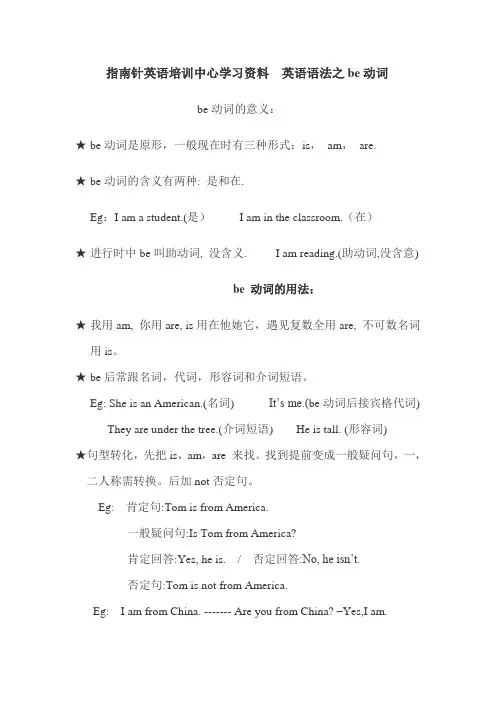
指南针英语培训中心学习资料英语语法之be动词be动词的意义:★be动词是原形,一般现在时有三种形式:is,am,are.★be动词的含义有两种: 是和在.Eg:I am a student.(是)I am in the classroom.(在)★进行时中be叫助动词, 没含义. I am reading.(助动词,没含意)be 动词的用法:★我用am, 你用are, is用在他她它,遇见复数全用are, 不可数名词用is。
★be后常跟名词,代词,形容词和介词短语。
Eg: She is an American.(名词) It’s me.(be动词后接宾格代词) They are under the tree.(介词短语) He is tall. (形容词)★句型转化,先把is,am,are 来找。
找到提前变成一般疑问句,一,二人称需转换。
后加not否定句。
Eg: 肯定句:Tom is from America.一般疑问句:Is Tom from America?肯定回答:Yes, he is. / 否定回答:No, he isn’t.否定句:Tom is not from America.Eg: I am from China. ------- Are you from China? –Yes,I am.用恰当的be动词填空。
(is, am, are)一1.I ______ a girl.2.My name _______ Mary.3.I ______ in Class 2, Grade 7.4.I ______ 12 years old.5.Here ______ my family photo.6.Look! These ______ my parents and those _______ mygrandparents.7.This boy ______ my brother.8.He ________ 15 years old now.9.That ______ my cat,Mimi.10.It ______ very lovely.二11. I ________from Australia.12. She _______ a student.13. Jane and Tom _________my friends.14. My parents _______very busy every day.15. I _______ at school.16. He ________ at school.17. We ________ students.18. They ________ from China.19. Yang Ling ________ eleven years old.20. Where ________ your friends?21. How old __________ you last year?22. Which dog ________ yours?23. Ten and two ________ twelve.三24. I ______ a boy. ______ you a boy? No, I _____ not.25. The girl______ Jack's sister.26. The dog _______ tall and fat.27. The man with big eyes _______ a teacher.28.. Mike and Liu Tao ______ at school.29. That ______ my red skirt.30..The jeans ______ on the desk. .31. The black gloves ______ for Su Yang.32. This pair of gloves ______ for Yang Ling.33. The two cups of milk _____ for me.34. Some tea ______ in the glass.35. Gao shan's shirt _______ over there.36. My sister's name ______Nancy.37. This ______ not Wang Fang's pencil38. You, he and I ______ from China.四39. Here ______ a scarf for you.40. Here ______ some sweaters for you.41. There ______ a girl in the room.42. There ______ some apples on the tree.43. There _______ some bread on the plate.44. There _______ a boy, two girls, three men and ten women in the park.五:45. ______ your brother in the classroom?46. ______ David and Helen from England?47. _______ there any kites in the classroom?48. _______ there any apple juice in the bottle?六:49.Where ________ your friends?50. How old __________ you last year?51. Which dog ________ yours?52.Where _____ your mother? She ______ at home.53. How _______ your father?54. Whose dress ______ this?55. Whose socks ______ they?56. Who ______ I?根据要求转换句型:57. She is a lovely girl. (变为否定句)58..They are Chinese.(同上)59.They are in the same class.(变成一般疑问句,并进行肯定和否定回答)60.Tim is an American boy.(变成一般疑问句, 并进行肯定和否定回答)61.Ketty and Mary are friends.(变成一般疑问句,并进行肯定和否定回答)62.We are in the supermarket.(同上)63.You are from Japan.(同上)64.I am Alice.(同上)65.Tim is from France.(变为否定句)。
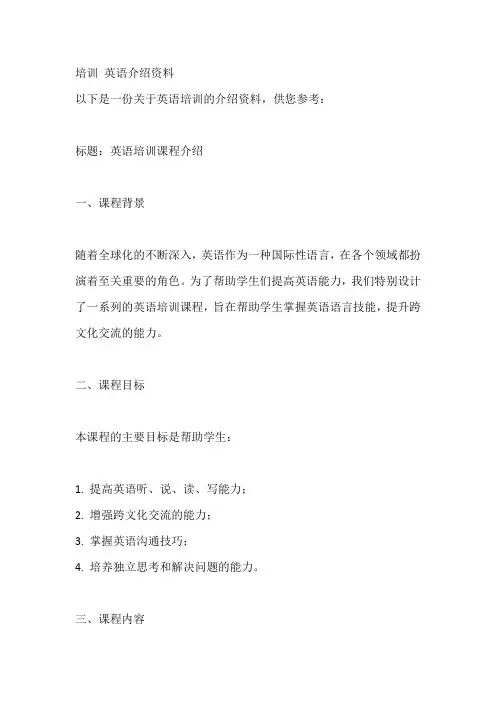
培训英语介绍资料以下是一份关于英语培训的介绍资料,供您参考:标题:英语培训课程介绍一、课程背景随着全球化的不断深入,英语作为一种国际性语言,在各个领域都扮演着至关重要的角色。
为了帮助学生们提高英语能力,我们特别设计了一系列的英语培训课程,旨在帮助学生掌握英语语言技能,提升跨文化交流的能力。
二、课程目标本课程的主要目标是帮助学生:1. 提高英语听、说、读、写能力;2. 增强跨文化交流的能力;3. 掌握英语沟通技巧;4. 培养独立思考和解决问题的能力。
三、课程内容本英语培训课程分为以下几个模块:1. 听力训练:通过多样化的听力材料,如新闻、电影、讲座等,训练学生的听力技巧,提高其理解能力。
2. 口语表达:通过角色扮演、讨论、演讲等活动,培养学生的口语表达能力,并帮助其熟悉不同场合的用语。
3. 阅读理解:通过阅读英文文章,提高学生的阅读能力和阅读速度,同时增强其理解和分析能力。
4. 写作技巧:通过写作练习和范文分析,提高学生的写作技巧,包括语法、词汇、段落组织等。
5. 跨文化交流:通过对比分析中西文化差异,培养学生的跨文化交流能力,包括礼仪、习俗、价值观等方面。
6. 沟通技巧:通过模拟真实场景,教授学生沟通技巧,如有效倾听、提问技巧、情感管理等。
7. 独立思考与解决问题:通过问题解决和批判性思维练习,培养学生独立思考和解决问题的能力。
四、教学方法本课程采用以下教学方法:1. 互动教学:通过互动活动,鼓励学生积极参与,锻炼其口语表达和听力理解能力。
2. 个性化指导:针对学生的不同需求和能力水平,提供个性化的指导和建议。
3. 小组合作:通过小组合作,培养学生的团队协作能力,同时增强其跨文化交流能力。
4. 案例分析:通过真实案例的分析和讨论,帮助学生将理论知识应用于实际情境。
5. 技术支持:利用现代教学技术,如在线学习平台、多媒体资源等,提高教学效果和学生学习效率。
五、课程安排与评估本英语培训课程分为10个阶段,每阶段持续4周。
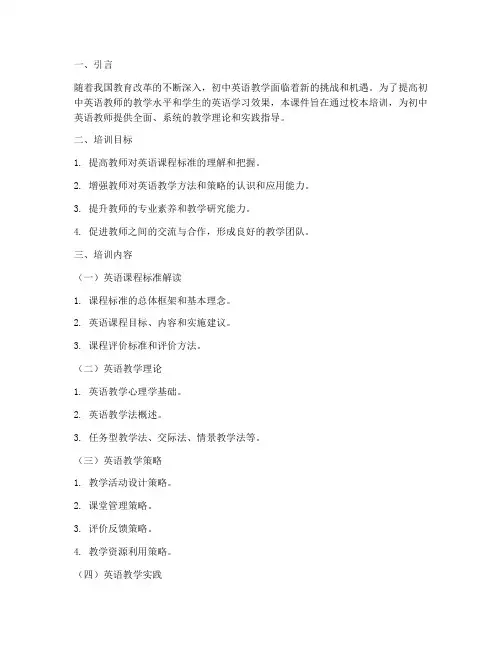
一、引言随着我国教育改革的不断深入,初中英语教学面临着新的挑战和机遇。
为了提高初中英语教师的教学水平和学生的英语学习效果,本课件旨在通过校本培训,为初中英语教师提供全面、系统的教学理论和实践指导。
二、培训目标1. 提高教师对英语课程标准的理解和把握。
2. 增强教师对英语教学方法和策略的认识和应用能力。
3. 提升教师的专业素养和教学研究能力。
4. 促进教师之间的交流与合作,形成良好的教学团队。
三、培训内容(一)英语课程标准解读1. 课程标准的总体框架和基本理念。
2. 英语课程目标、内容和实施建议。
3. 课程评价标准和评价方法。
(二)英语教学理论1. 英语教学心理学基础。
2. 英语教学法概述。
3. 任务型教学法、交际法、情景教学法等。
(三)英语教学策略1. 教学活动设计策略。
2. 课堂管理策略。
3. 评价反馈策略。
4. 教学资源利用策略。
(四)英语教学实践1. 教学案例分析。
2. 课堂教学观摩与研讨。
3. 教学反思与改进。
(五)英语教师专业素养1. 教师职业道德与专业精神。
2. 教师职业素养与教学能力。
3. 教师终身学习与专业发展。
四、培训方法1. 讲座与研讨:邀请专家进行专题讲座,组织教师进行研讨交流。
2. 观摩与反思:组织教师观摩优秀课堂教学,进行教学反思与改进。
3. 案例分析:分析教学案例,探讨教学策略和方法。
4. 实践操作:组织教师进行教学实践,提高教学技能。
五、培训安排1. 培训时间:每周一次,每次2小时。
2. 培训地点:学校多功能厅或英语教室。
3. 培训对象:全体初中英语教师。
4. 培训考核:参加培训的教师需完成培训笔记、教学反思、教学设计等任务,并进行结业考核。
六、培训效果评估1. 教师对培训内容的满意度。
2. 教师教学能力和教学效果的提升。
3. 学生英语学习兴趣和学习成绩的提高。
七、结语通过校本培训,我们相信初中英语教师的教学水平和学生的英语学习效果将得到显著提升。
让我们共同努力,为我国初中英语教育事业的发展贡献力量。
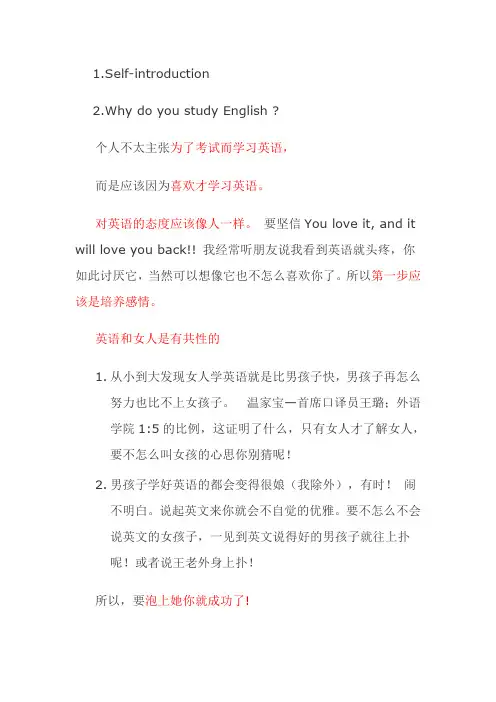
1.Self-introduction2.Why do you study English ?个人不太主张为了考试而学习英语,而是应该因为喜欢才学习英语。
对英语的态度应该像人一样。
要坚信You love it, and it will love you back!! 我经常听朋友说我看到英语就头疼,你如此讨厌它,当然可以想像它也不怎么喜欢你了。
所以第一步应该是培养感情。
英语和女人是有共性的1.从小到大发现女人学英语就是比男孩子快,男孩子再怎么努力也比不上女孩子。
温家宝—首席口译员王璐;外语学院1:5的比例,这证明了什么,只有女人才了解女人,要不怎么叫女孩的心思你别猜呢!2.男孩子学好英语的都会变得很娘(我除外),有时!闹不明白。
说起英文来你就会不自觉的优雅。
要不怎么不会说英文的女孩子,一见到英文说得好的男孩子就往上扑呢!或者说王老外身上扑!所以,要泡上她你就成功了!问题:怎么追女孩儿的?哈巴狗(百依百顺)—狼狗(咬别的狗)-- 看门狗(爱家)女孩子--交女生朋友一样就好了培养感情需要时间,那么你每天花在英语这个女人上的时间就一定要多,刚开始她肯定反感你,你也不了解她,慢慢的培养感情,朋友,十分钟,十五分钟,小小的改变,了解,不讨厌,不反感,那你就进步多了。
感情培养起来—习惯---从中获得乐趣---到这一步感情就出来了---从被迫学习变成主动学习了。
很多事情归根到底到是态度问题,我觉得只有心态正了,让她成为你的兴趣而不要只是为了考试,整天想着为了考试你是没办法学好的,只要这样才能学得开心,无忧无虑间自己没发觉,别人已经意识到你踏出一大步了。
3.Read the text4.vocabularyL1-4 GRAMMAR1.THERE BE 结构表示“在什么地方或时间存在什么事物”there 本身没有意义。
There are two children in the rooma)There is /was+单数名词+表示场所的介词短语There is a smile on her face.There was a puppy in my familyb)There are/ were + 复数名词+ 表示场所的介词短语There are some apples in the basket.There were some books on the desk just nowThere 与have的区别都表示“有”。
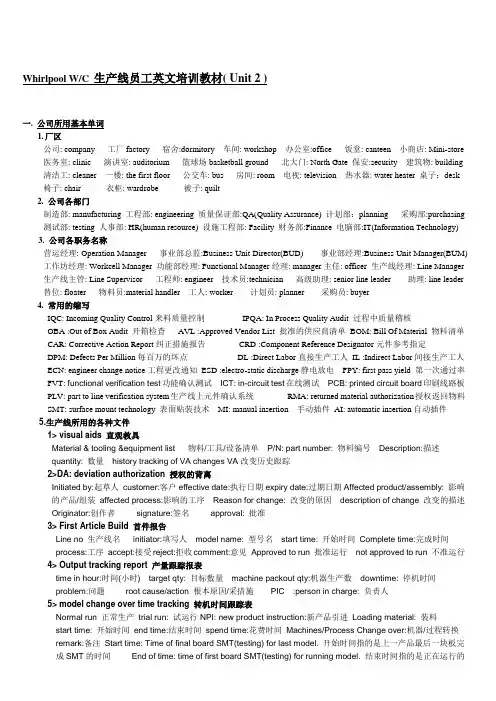
Whirlpool W/C 生产线员工英文培训教材( Unit 2 )一. 公司所用基本单词1.厂区公司: company 工厂factory 宿舍:dormitory 车间: workshop 办公室:office 饭堂: canteen 小商店: Mini-store 医务室: clinic 演讲室: auditorium 篮球场basketball ground 北大门: North Gate 保安:security 建筑物: building 清洁工: cleaner 一楼: the first floor 公交车: bus 房间: room 电视: television 热水器: water heater 桌子:desk 椅子: chair 衣柜: wardrobe 被子: quilt2. 公司各部门制造部: manufacturing 工程部: engineering 质量保证部:QA(Quality Assurance) 计划部:planning 采购部:purchasing 测试部: testing 人事部: HR(human resource) 设施工程部: Facility 财务部:Finance 电脑部:IT(Information Technology)3. 公司各职务名称营运经理: Operation Manager 事业部总监:Business Unit Director(BUD) 事业部经理:Business Unit Manager(BUM) 工作坊经理: Workcell Manager 功能部经理: Functional Manager经理: manager主任: officer 生产线经理: Line Manager 生产线主管: Line Supervisor 工程师: engineer 技术员:technician 高级助理: senior line leader 助理: line leader 替位: floater 物料员:material handler 工人: worker 计划员: planner 采购员: buyer4. 常用的缩写IQC: Incoming Quality Control来料质量控制IPQA: In Process Quality Audit 过程中质量稽核OBA :Out of Box Audit 开箱检查AVL :Approved Vendor List 批准的供应商清单BOM: Bill Of Material 物料清单CAR: Corrective Action Report纠正措施报告CRD :Component Reference Designator元件参考指定DPM: Defects Per Million每百万的坏点DL :Direct Labor直接生产工人IL :Indirect Labor间接生产工人ECN: engineer change notice工程更改通知ESD :electro-static discharge静电放电FPY: first pass yield 第一次通过率FVT: functional verification test功能确认测试ICT: in-circuit test在线测试PCB: printed circuit board印刷线路板PLV: part to line verification system生产线上元件确认系统RMA: returned material authorization授权返回物料SMT: surface mount technology 表面贴装技术MI: manual insertion 手动插件AI: automatic insertion自动插件5.生产线所用的各种文件1> visual aids 直观教具Material & tooling &equipment list 物料/工具/设备清单P/N: part number: 物料编号Description:描述quantity: 数量history tracking of VA changes VA改变历史跟踪2>DA: deviation authorization 授权的背离Initiated by:起草人customer:客户effective date:执行日期expiry date:过期日期Affected product/assembly: 影响的产品/组装affected process:影响的工序Reason for change: 改变的原因description of change 改变的描述Originator:创作者signature:签名approval: 批准3> First Article Build 首件报告Line no 生产线名initiator:填写人model name: 型号名start time: 开始时间Complete time:完成时间process:工序accept:接受reject:拒收comment:意见Approved to run 批准运行not approved to run 不准运行4> Output tracking report 产量跟踪报表time in hour:时间(小时) target qty: 目标数量machine packout qty:机器生产数downtime: 停机时间problem:问题root cause/action 根本原因/采措施PIC :person in charge: 负责人5> model change over time tracking 转机时间跟踪表Normal run 正常生产trial run: 试运行NPI: new product instruction:新产品引进Loading material: 装料start time: 开始时间end time:结束时间spend time:花费时间Machines/Process Change over:机器/过程转换remark:备注Start time: Time of final board SMT(testing) for last model. 开始时间指的是上一产品最后一块板完成SMT的时间End of time: time of first board SMT(testing) for running model. 结束时间指的是正在运行的产品第一块板完成SMT的时间Model change over time:(max of processes’ change over time) 转拉时间指的是在转拉过程中最长工序所花费的时间二.口语训练Nice to Meet You很高兴认识你听下列对话,练习自读跟读。
培训材料(10)一、写出并熟记下列短语.1.去散步2.挤牛奶3.骑马4.照相5.与农民交谈6.在乡下7.钓鱼8.爬山9.沿途,一路上10.根本不,一点儿也不11.教某人做某事12.太多,大量13.总之,总的来说14.去郊游二、翻译并熟记下列句子。
15.在晚上,我看了星星。
16.你看了一些有趣的动物了吗?17.沿途我们看到了一些农场和村庄。
18.我根本不喜欢这次旅行。
19.昨天,我参观了动物园。
20.总之,它是令人激动的一天。
三、写出下列每个动词的过去式。
21.take 22.eat 23.learn24.stop 25.go 26.have28.climb 29.buy 30.worry四、单项选择(10分)31.He ______ to Beijing with his parents last spring.A.go B.goes C.went D.going32.—What did you do at home last Sunday? —I ______ an English book.A.read B.reads C.readed D.reading33.He put his book down and ______ me pick up my pen.A.help B.helped C.helps D.helping34.I told my parents I wasn't worried about the exam.But in fact I ______.A.is B.was C.did D.am35.It ______ rainy l ast Sunday,so Jim ______ TV at home.A.is;watched B.was;watch C.was;watched D.is;watch 36.—______ were the beaches? —They were beautiful but crowded.A.How B.What C.Where D.When37.—How was your vacation? —______.A.That sounds great B.It was great C.Fine, thanks D.Sure 38.The boy sat there for a long time without(没有)doing ______ after he finished his homework.A.something B.nothing C.anything D.everything39.The show wasn't ______.I wasn't ______ in it at all.A.interesting;interesting B.interesting;interestedC.interested;interested D.interested;interesting40.—______?—I watched TV at home.A.How was your weekend B.Where did you goC.What did y ou do D.When did you watch TV五、完形填空(10分)It was Sunday yesterday.Steve __41_ a relaxing weekend.__42__ Sunday morning, he played computer games with his friends at home.It __43__ pretty good.In the afternoon, he __44__ with his mother.They bought many kinds of food and vegetables.It was really relaxing and exciting.In the evening, he __45__ a talk show with his parents and lis tened to some songs by a __46__ singer.__47__ Ann had a busy weekend.She __48__ stopped working.On Sunday morning, she cleaned her bedroom and did her homework.In the afternoon, she went to visit her uncle and __49__ him do some farm work.In the evening, she cooked dinner for her parents.After dinner, she washed the dishes.Then she went out __50__ a walk with her dog.What about your weekend?41.A.has B.have C.had D.was42.A.In B.At C.For D.On43.A.be B.is C.was D.were44.A.goes shopping B.went shopping C.went to shopping D.went shops 45.A.watched B.watches C.looked D.see46.A.height B.medium C.popular D.long47.A.But B.Because C.Or D.So48.A.often B.always C.usually D.never49.A.helped B.liked C.asked D.told50.A.at B.for C.from D.onⅥ.阅读理解(30分)AKim went to a beautiful beach on Monday with his friends.It was sunny and hot.So they had great fun playing in th e water.In the afternoon,they went shopping.But the shops were crowded(拥挤),they didn't really enjoy it.The next day,it was rainy,so they went to a museum.It was boring.Kim found a small boy crying in the corner.The boy was lost.He helped the boy find his father.Kim was very happy.But he had no money for a taxi.So he had to walk back to the hotel.That made him very tired.On Wednesday,the weather was very cool.So they played tennis.They played all the morning.It was really fun.根据短文内容,判断句子正(T)误(F)。
RESTAURANT一.Welcome The Guest1.Welcome to our hotel, sir, Anything I can do for you?先生, 欢迎您来我们酒店. 我能为您做点什么吗?2.This way , please?这边请。
3.Welcome, sir. Step right in, please.欢迎光临,先生. 请进.4.Welcome back, Nice to meeting you again.欢迎您再来,很高兴又见到您.5.Good morning. How many persons of you, please?早上好,请问几位?6.Have you made/got a reservation, sir先生,您有预订座位吗?8.In whose name was the reservation made?请问是谁预订的餐位?9.Oh, Mr Smith. We’ve been/ We are expecting you.噢,史密斯先生,我们正等候着您呢?10.Where would you prefer to sit?您喜欢坐哪儿?11.What about that table near the window?靠窗边的位置怎么样?12.Is this table fine with you, madam?这张桌子可以吗, 夫人?13.I’m afraid all the private rooms are reserved. Would you mind sitting in the main dining rooms?恐怕所有的厅房都预订完了,您介意在主餐厅用餐吗?14.I’m s o glad you like it.很高兴您喜欢这儿.15.Here is the menu, please take your time. The waiter will be with you in a moment.这是菜单, 请享用您们的时光,服务员马上就来.二.Taking Orders16.What kind of drink would you like?您要喝什么饮料?17.Would you like to start with a glass of beer?您想先要一杯啤酒吗?18.May I take your order, madam?请问您要吃点什么,夫人?19.Are you ready to order now?您准备点菜了吗?20.Have you decided on something, sir?先生,您决定点什么菜吗?21.What are you going to have / take today?先生,您要吃点什么?22.What kind of dishes do you want?您要什么菜?23.What dishes do you particularly like?您特别喜欢吃什么菜?24.Would you like to order a set course or a la carte?您想叫一份套餐还是按菜单点菜?25.What sort of appetizer would you like?您想来点什么开胃品?26.Would you like some hors d`oeuvres?您是否要来点餐前小吃?27.Would you like to have something to start with before your main course?上主菜前您要来点什么吗?28.What sort of side dish would you like?您想要点什么配菜?29.Would kind of beverage do you like to go with your meal??您想要您的菜配什么酒?30.What kind of vegetable would you like to have?您想吃点什么蔬菜?31.What kind of soup do you like to have before the main course?您吃主菜前要喝点什么样的汤?32.How many portions?要几份?33.What would you like to follow?您下一道菜点什么?34.If you order a set dinner, you get your choice of soup or juice, one entrée with potato, vegetable, salad, bread, butter and sometimes coffeeand even dessert for a set price.如果您吃套菜, 您可以在规定的价格内选择某些食品, 汤或果汁, 一份主菜配土豆,沙拉, 黄油面包,有时还有咖啡,甚至甜点.35.What would you prefer, coffee or tea?您想要喝点什么, 咖啡还是茶?36.Is there anything else you would like to have? /Is there anything that you want?还有别的您想要吗?37.Roast Duck. There will be a slight delay for that.烤鸭, 那会稍微慢一点.38.Pizza will take about ten minutes to prepare. Would you mind waiting?比萨大概要10分钟才能做好, 您愿意等吗?39.Your order will be ready in a few minutes.您点的菜一会儿就来.40.The dish you ordered is come immediately.您点的菜马上就来.41.The T-bone steak is very good, I would suggest that you try it.T 型骨牛排很不错的.我建议您们试试这道菜.42.Can I recommend the Grand Marnia, sir. It’s very popular.先生,我推荐金万利,这种酒很受欢迎.43.We have a very nice vegetable today. Wine flavored bamboo shoots, it’s our chef’s recommendation. It’s delicious and worth a try.我们今天的蔬菜不错, 酒醉冬笋是我们主厨的拿手菜, 它的味道好值得一尝.44.Chinese food is divided into eight big cuisines, such as Cantonese food, Sichuan food, Fujian food, etc. Our restaurant is famous for itsCantonese style.中国菜可分为八大菜系, 有粤, 川, 闽等等. 我们餐厅以粤味风格的菜而闻名.45.What about the eggplant and min ced pork in dry red chilisauce ? It’s our special course.鱼香茄子怎么样? 它们是我们的特色菜.46.May I serve soup to you now?我现在可以上汤吗?47.Shall I put the fish in the middle of the table?我把鱼放在桌子中央好吗?48.Your eggs will be ready in a few minutes.您点的鸡蛋马上就来.49.The food is best while eaten hot. Please enjoy your meal.这道菜趁热吃最好,请慢慢享受.50.Take your time and enjoy it.请慢享受.51.Hope you’ll enjoy your dinner.希望您用餐愉快.52.Wish you a good appetite祝您用餐愉快。
2021级英语科优生培训资料(五)第一部分阅读理解ARecently a growing number of foreign universities, such as the University of Cambridge, are accepting China's gaokao results as one of their admission standards. Is the Chinese college entrance exam being recognized globally? Forum readers share their opinions:Cecilia Zhang(China)The gaokao is a really tough exam. If possible, it can be used as one of the indicators(指标)for foreign universities, in addition to other indicators, such as how well they speak the target language. The students, who perform well in the gaokao, also have the ability to successfully adapt to Western styles of education. I believe accepting the gaokao as an indicator is a win-win for Chinese students and overseas universities.Wchao37(US)In fact, gaokao is perhaps much more difficult than the SAT or ACT exams. You can get a perfect score of 1,600 on the SAT but not in the gaokao, partly because the SAT is a machine-scored multiple-choice exam. Do you know anyone that has ever achieved a perfect score in the gaokao?Harry01(UK)Hundreds of students from China have entered universities in the UK using their gaokao scores, which requires that their knowledge of English be above a certain level. This measure has benefited specific groups of students from various backgrounds in China.Mbursian(Canada)In order to attend a university in an English speaking country, a student needs to have an acceptable band score on the IELTS. Most importantly, students need an acceptable knowledge of the language spoken in any country they plan to study in. Now the Chinese gaokao is closer to meeting the requirements of different countries.1. Who believes accepting the Chinese gaokao is a win-win?A. Cecilia Zhang.B.Wchao37.C.Harry01.D.Mbursian.2. What is most important for Chinese students planning to study abroad according to Mbursian?A. The IELTS score.B. Enough test preparation.C. The Chinese gaokao score.D.Knowledge of the native language.3.What does the text intend to tell the readers?A. The gaokao will replace other tests.B. The gaokao is becoming globally accepted.C. The gaokao is the most difficult of all tests.D. The University of Cambridge made a good decision.BJeremy Locke,who owns a roofing and construction company in Glace Bay,Nova Scotia, had always been wanting to repair the roof of Jeanette MacDonald's home. Whenever he drove past the woman's home, he assumed that the roof was under repair because the job had already been taken on by another group of repairmen-but as the weeks wore on,the roof continued to worsen without any signs of repair.“I had it in my mind that if no one steps up to help this lady in our community, I'd be more than happy to,” Locke told CBC.When Locke finally reached out to MacDonald about fixing her roof for free, however, she politely declined his offer because she did not like to accept charity. That being said, she had already applied for a government grant(补助金)to fix the roof and she said she was more than happy to hire Locke once her grant application was approved. Unfortunately, MacDonald never received the approval.As the stubborn(固执的)Canadian senior refused to accept any assistance from Locke, the sympathetic construction worker played an innocent trick in order to get her to accept his help. He invited MacDonald to enter a raffle(抽奖活动)that his business was holding for a free roof. After the grandmother-of-four accepted one of the raffle tickets, Locke told her that she was the winner-because she was the only one who had entered the raffle.Thanks to his sweet little plan, Locke and his crew are starting work on the roof this week, which is expected to cost his company about $9,000. MacDonald, meanwhile,told CBC that she doesn't know how to express her gratitude to Locke, saying that he is her “guardian angel”。
保安部英语培训资料Part1:欢迎问候语1.Good morning. 早上好。
Good afternoon. 下午好。
Good evening. 晚上好。
2.Hello. 你好。
3.Welcome. 欢迎。
4.How are you today? 你今天好吗?-I'm fine .Thank you.And you? 我很好,谢谢。
你呢?Part2:征询用语1.May I help you? 我能帮你什么吗?2.Wait a moment,please. 请稍等一下。
Part3:答谢与应答答谢:Thank you. 谢谢。
应答:My pleasure. 很高兴为您服务。
Part:4:致歉用语1.Excuse me. 打扰一下!2.I am sorry. 我感到很抱歉!3.That' OK. 没关系。
听不清楚时:1.Pardon,please? 没听清?2.Sorry,I don't know. 对不起,我没听清楚。
3.Wait a moment , please . 请稍等一下。
Part5:指路与引路1. Follow me ,please! 请跟我来!2. This way,please . 请走这边。
3.Sorry, I don't know. Please go to the front desk.对不起,我不知道。
请到前台咨询。
Part6:提示用语1.No smoking here,please。
请不要在这里吸烟。
2.No parking here,please. 请不要在这里吸烟。
3.After you. 您先请。
Part7:告别欢送语1.Goodbye!再见。
2. See you! 再见!3. Good day! 祝您过得愉快!附注:数字:1 :one 2:two 3: three 4:four 5:five 6: six 7: seven 8: eight 9: nine 10 : ten。
酒店英语培训资料酒店英语培训资料(一)1、礼貌地与客人打招呼及称呼客人,表示你对他们的热情欢迎:—“早上好,小姐/先生。
”“Goodmorning,madam/sir.”—“下午好,小姐/先生。
”“Goodafternoon,madam/sir.”—“晚上好,小姐/先生。
”“Goodevening,madam/sir.”﹡客人喜爱听你称呼他的姓氏,因此尽可能常用,如:“王先生,陈小姐,李太太”等。
—“专门快乐再次见到您(欢迎再次光临),王先生。
”“Nicetosee/meetyouagain,Mr.Wang.”或与客人互相寒暄:—“您今天好吗?”“Howareyou(today)?”—“我专门好,感谢,你呢?”“I’mfine,thankyou,andyou?”—“专门好,感谢您?”“I’mverywell,/I’mfine,too.Thankyou.”酒店英语培训资料:※UsefulWordsandExpressions:1)Sir2)Madam3)Miss4)Ms5)meet6)Goodmorning/afternoon/evening!7)Glad/Niceto…8)Howdoyoudo?/Howareyou?酒店英语培训资料(二)2、主动向客人提供关心:—“我能够帮您吗?”“MayIhelpyou?”/WhatcanIdoforyou?”﹡尽量为客人多做一点:—“还有什么需要我帮您吗?”“IsthereanythingelseIcandoforyou?”※UsefulWordsandExpressions:1)May/CanI…?2)Ifyouneedmyhelp,justcallmeplease.3、记住一些能讨人喜爱的言词:—“感谢。
”“Thankyou.”—“别客气。
”“Youarewelcome.”—“对不起。
”“I’msorry.”—“没关系。
”“That’sallright.”—“请。